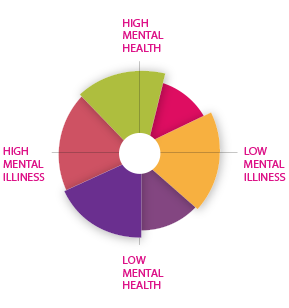
What is Mental Health?
According to World Health Organization (WHO), mental health is defined as a state of health, which highlights the fact that mental health is a indispensable part of health.
Mental health is not merely the absence of mental issues or illness; it includes also:
Realization of one’s own potential
Ability to cope with stress in life
Ability to work effectively
Ability to contribute to the community
Sociologist Corey Keyes shares similar viewpoints on what “mental health” is.
According to the research findings of Two Continua Model of Mental Health published by Corey Keyes in 2007, mental health and mental illness are two related yet distinct factors of mental well-being. Mental well-being shall be seen in a holistic view: mental well-being is not just the absence of mental illness, it is but also the presence of mental health, which should include:

Hedonic/Emotional Well-being:
feeling happy about your life

Eudaimonic/ Psychological Well-being:
finding meaning in your life

Social well-being :
feeling connected with social networks that are meaningful to you
People who possess all three above-mentioned well-beings at the same time are said to have a good and sound state of mental health, or we could also describe the state as flourishing.
Keyes’ Two Continua Model of mental health shows that in a holistic model of mental well-being, mental health is not directly related to the absence or presence of mental illness.
The model places mental health and diagnosis of mental illness into two axes. The axis indicating mental health is divided into three levels, while another axis representing diagnosis of mental illness is categorized as either "with mental illness" or "without mental illness". This shows that "mental health" and "diagnosis of mental illness" are two independent yet related concepts, and are not in any way mutually exclusive.
Are you now being at the state of “flourishing”?

